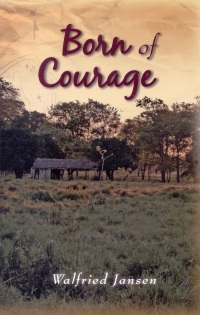| ________________
CM . . .
. Volume XX Number 7. . . .October 18, 2013
excerpt:
Born of Courage, a boys' adventure novel, cannot be called a "western" because this genre is set in the 19th century North American west. Jansen's story, set in the grasslands and jungle of Paraguay in the mid-20th century, has all the drama and detail of a Louis L'Amour or Larry McMurtry novel and is more exotic. A bereaved husband, Lothar Brauer, and his two grieving sons, Tomas, 12, and Martin, 16, have left their home in the farming community of Parburg, Paraguay, for their small landholding in the central grasslands. There, hunting and fishing and being alone together, they try to come to terms with the loss of Sofia, the wife and mother. When readers learn that she died of snake bite while gathering eggs, they will realize that they are in a pioneer setting where nature is "red in tooth and claw". Author Walfried Jansen knows his setting well. He was born in Paraguay, but he left at age eight, in 1957, with his parents and two brothers, to settle in Winnipeg. In his acknowledgements, he mentions his three recent research trips to Paraguay in order to get the details right. Indeed, his presentation of the vegetation, climate, flora and fauna of this South American country make his story unique and extraordinary. Imagine a place where it is normal to see piranha, a toucan, a macaw and blue Morpho butterflies! Jansen provides a useful glossary, informing readers about various species, with a brief history and geography of Paraguay. Readers wondering how this family with German names happened to be in a South American country can turn to the end and learn about the German colony, founded in 1887 by a Dr. Bernhard Forster who left Germany because of his belief in "Aryan superiority". Jansen notes that Dr. Josef Mengele hid out for a while in the Nuevo Germania community after World War II. The settlers, however, soon forgot their founders' ideas and "integrated into the Paraguayan culture". The Brauers focus is not on racial theories, but on survival. As the novel opens, the boys are fishing some distance from their adobe hut, and their father is washing their clothes in a pond. Two horsemen appear, leading a black Arabian stallion, and they demand food from Lothar, who has none to give them. Calling him a "Saxon gringo", they kidnap him, saying that they will take him to the Sanchez ranch to do chores and learn manners. After setting fire to the house and contents, they ride away. Seeing the smoke, Tomas and Martin rush home and find the place burning and their father gone. Salvaging what they can (fishing hooks and line, matches, a file, and their unwashed clothes), they cut two sharp poles to use as spears and set out on foot with their dog, Caesar, following the abductors' tracks. Their quest takes Canadian readers through a strange and marvellous landscape. After losing the tracks, they stay for a while in a riverside location where game and wild pineapple are plentiful, and where their father would pass through if he escapes. Skilled at living off the land, the youths build a tree house from vines, bamboo and woven grass daubed with mud. Born of Courage is full of exciting wilderness encounters, such as the narrow escape from a jaguar in pursuit of a tapir, the successful hunting of a wild boar, and an encounter with an anaconda. The boys acquire a parrot, Max. Coming upon a herd of wild horses, Martin lassoes and capture a mare with a colt. Although the middle of the novel is full of colour and action, the solution to the main problem - Lothar's fate - is delayed a bit too long. Eventually the boys move on to new territory. In a fight with a hostile horseman, Martin is the victor. Later, they meet a decent man, Carlos Gonzales, who explains that their father broke his leg at the Sanchez ranch and that he and another rider were sent to look for the boys. Of the abduction, Carlos merely says, "The unfortunate incident was perpetrated by two other men and that is all I can tell you." Quite late on, in Chapter 24, the author summarizes Lothar's adventures. Probably author Jansen withheld the information to create suspense and tension. Another way of structuring the novel would have been to alternate the chapters about the boys' adventures with chapters about Lothar's experiences. At the beginning, Tomas is the weakest family member, being the youngest and the hardest-hit with grief. As the novel progresses, he becomes stronger, more self-reliant, and resourceful. Near the end, at the Sanchez estate, he performs an act of heroism. The final challenge from Raul and Pedro, the cruel xenophobic hombres who kidnapped Lothar, ends as one would hope. Readers of all ages like happy endings, and Born of Courage does not disappoint. Recommended. Ruth Latta's most recent novel, The Songcatcher and Me (Ottawa, Baico, 2013, baico@bellnet.ca) is for young teenagers.
To comment
on this title or this review, send mail to cm@umanitoba.ca.
Copyright © the Manitoba Library Association. Reproduction for personal
use is permitted only if this copyright notice is maintained. Any
other reproduction is prohibited without permission.
NEXT REVIEW |
TABLE OF CONTENTS FOR THIS ISSUE
- October 18, 2013.
AUTHORS |
TITLES |
MEDIA REVIEWS |
PROFILES |
BACK ISSUES |
SEARCH |
CMARCHIVE |
HOME |
